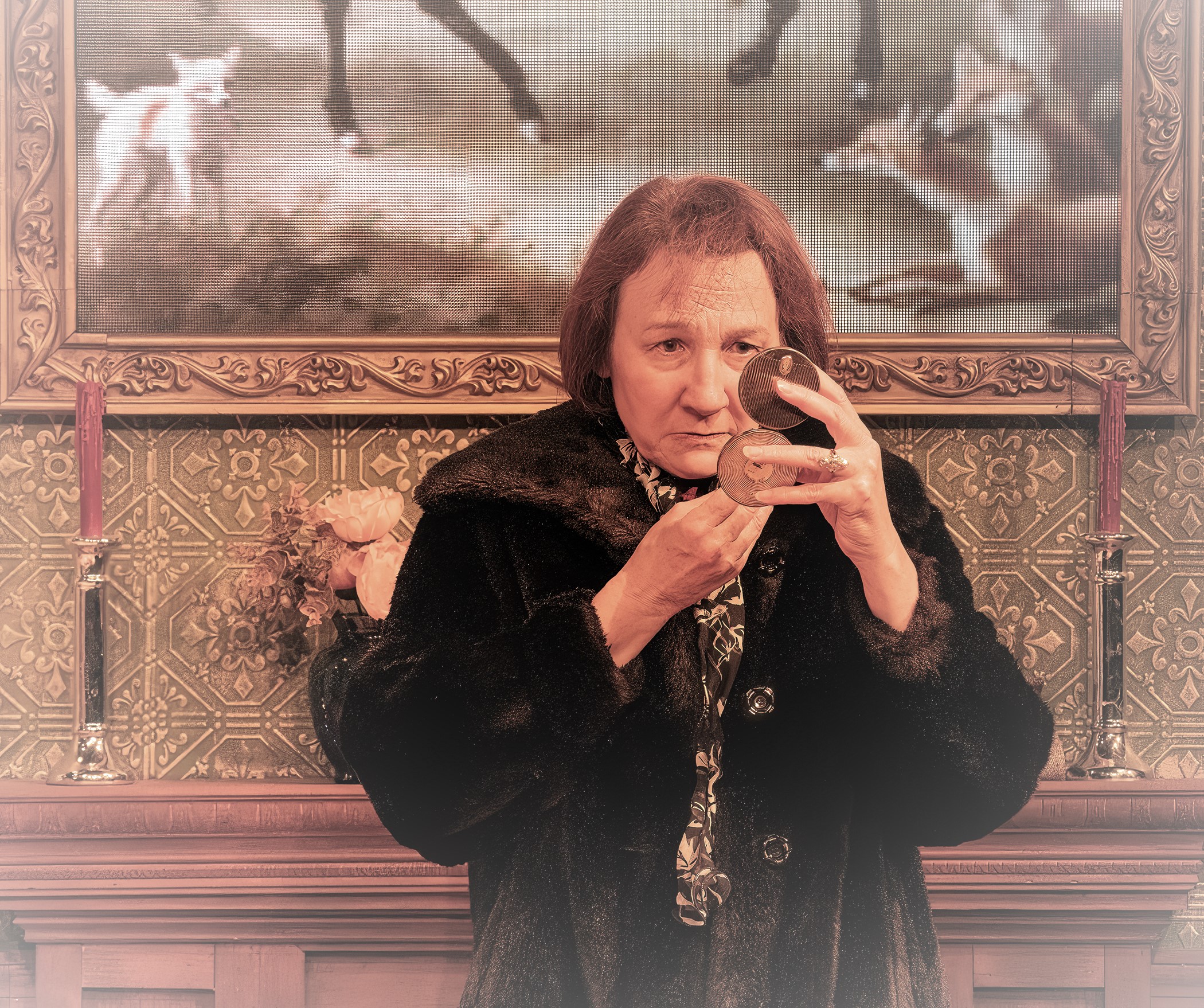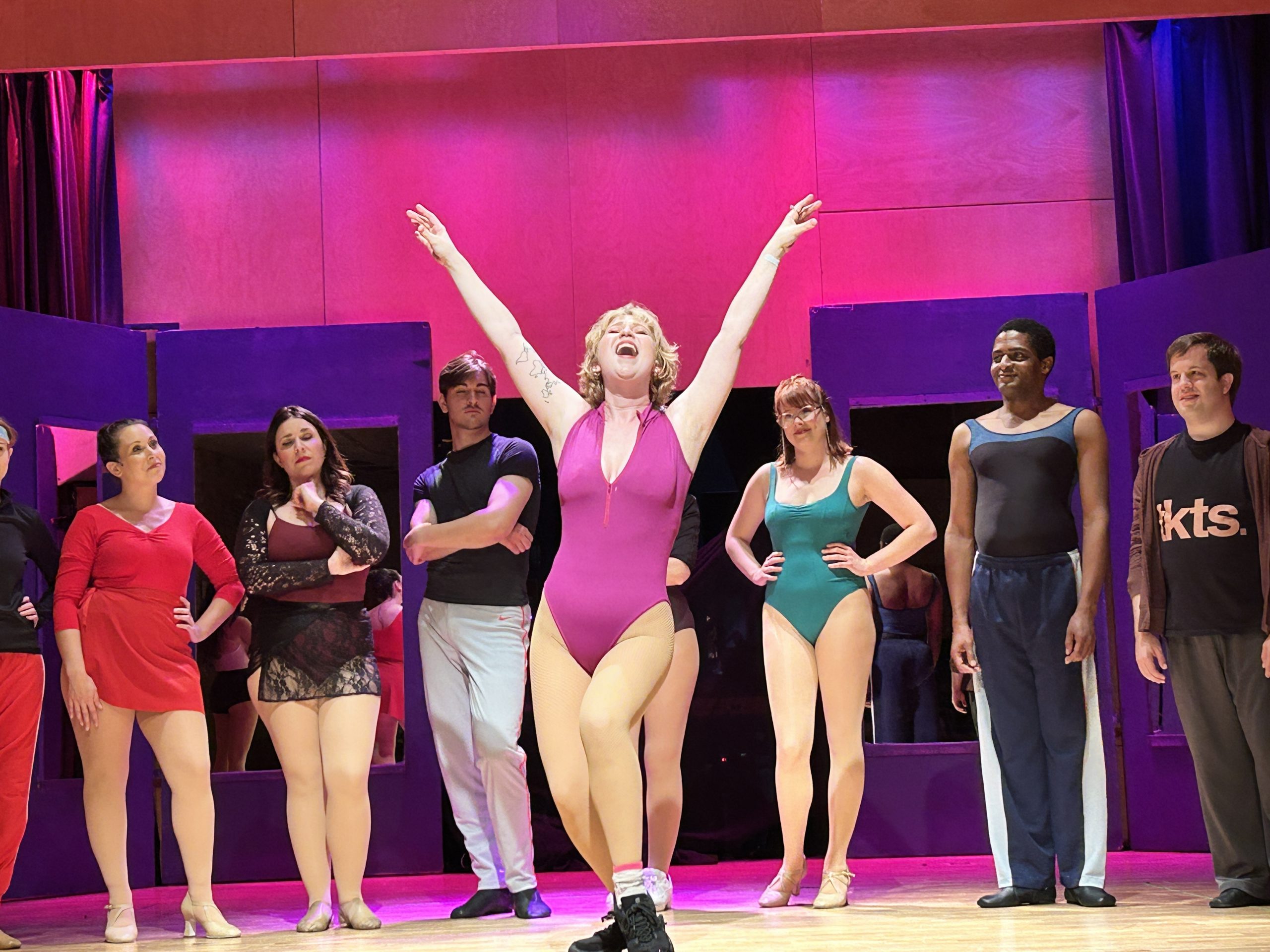by Rikki Lee Travolta
Agatha Christie’s The Mousetrap is the world’s longest-running play, and for very good reason. It is a masterful murder mystery that is packed full of suspense, intrigue, and unexpected twists. The Citadel Theatre’s production of The Mousetrap, directed by Scott Westerman, is a faithful and well-executed adaptation of Christie’s timeless work.
Citadel Theatre has proven itself as a company that both pays reverence to the standards, but isn’t afraid to introduce new concepts. This was never more apparent than in its phenomenal 2022 production of the campy, fun musical Little Shop of Horrors.

Although the Citadel production of The Mousetrap retains the framework of the Agatha Christie script, director Westerman also shows that he isn’t afraid to play with themes, angles, and details.
Written to be set in the 1950’s, the play begins with a young couple, Mollie and Giles Ralston, inheriting a remote country guesthouse. On their first night of business, they are joined by a group of strangers, all of whom seem to have something to hide.
When a snowstorm gets out of hand, the lodging house is cut off from the outside world. This occurs just as news of a recent murder is hitting the radio airwaves. The level of danger revolving around the murder turns out to be severe enough that a police sergeant braves the weather to trek through the blizzard conditions to the hotel to investigate a lead that one of the guests might be the murderer.
Westerman’s direction is tight and suspenseful, and he keeps the audience guessing until the very end. There are moments of suspense, intrigue, and even flashes of humor.
The success of The Mousetrap hinges as much on the actors as it does the direction. The cast of The Mousetrap at Citadel Theatre is overall very strong. The talents on stage represent a wide range of backgrounds and experience levels. Each actor brings their character to life with attention to adding subtle nuances and depth.

Mary Margaret McCormack and Jack Sharkey play the married innkeepers, Mollie and Giles Ralston. Both are strong actors who shine in individual moments. Sharkey has some great reactions when guests offer absurd or offending contributions to their conversations. McCormack shows off true scream queen qualities in her reaction to the surprise turns of events at the end of Act I.
Kristie Berger is a dynamo as Mrs. Boyle – a rather unpleasant woman with a demanding disposition and total lack of personability. Her performance is one of the many highlights of the show.
Mrs. Boyle arrives at the lodging house under the company of Major Metcalf, played by the talented William Ryder. They are also joined by a young architect named Christopher Wren, who explains that his parents named him after the more famous architect who bears the same moniker in hopes it would inspire him to a similar level of career success. Wren is played by Jesús Barajas who works hard to impress. He creates a character that is both captivating and unsettling.

The other guests at the inn include Amy Stricker as Miss Casewell, an icy woman who comes across cold and aloof, and Reginald Hemphill as an almost psychopathic unexpected guest named Mr. Paravicini.
Stricker is an tremendous actress whom audiences will recognize from the Jeff Award-winning production of High Fidelity at Refuge Theatre, as well as recent work on the hit television crime drama Chicago PD. With an ideal sense of timing, she eventually lets the audience see Casewell’s compassionate side. Stricker is one of the best at delivering a fully-developed, well-rounded character.
Hemphill offers big facial expressions and some scary undercurrents to his character, meant to put the audience and the other guests ill at ease. It works. The foreigner of non-descript origins also offers different accents to add to the mystery of his nature.
The final piece to the Agatha Christie puzzle is Sean Erik Wesslund as Detective Sergeant Trotter, the young policeman who travels to the inn to question the guests about the London murder. Wessleund brings a sense of urgency and professionalism to the role, and his performance is both believable and engaging. It is a tough part that specifically requires a young actor and Wesslund lives up to the demands of the role with aplomb.

As the world’s longest-running play, The Mousetrap has been performed to near perfection by casts around the world for decades. You can’t blame a director for wanting to stretch boundaries and try new ways to interpret the work.
For the Citadel production, director Westerman goes tech-heavy. The director, cinematographer Ian Merritt, production manager Jessica Greenhoe, and production managers Elle Phelps and Scott Phelps use impressive digital screens intermixed with a traditional set by Catalina Niño to create a time-fluid interpretation.
There are elements of the production that are very respectful of the original Agatha Christie script, while other touches like interactive video add a futuristic element to the play. The time-fluid concept also is embraced in the characters, with some being very period-specific to the 1950s and others being very modern in look, attitude, and delivery.
Sound design by Petter Wahlbäck is very impressive and very detailed. Even the sound of the opening of doors is digitally enhanced. Lighting design by Brian Elston is very good as well.
Costume design is by Danielle Reinhardt, properties are by Katie Novak, and house management is by Bruce Ackerman. Additional credits go to Megan Lorie as dialect coach, Jason Clark as master carpenter, Alex Trinh as run crew, and Abby West as scenic charge artist. John Olson Communications does an excellent job handling publicity and promotions.
Since the COVID-19 pandemic first hit the world, the importance of having talented understudies for each role in a theatrical production has become paramount. Understudies for The Mousetrap include Julie Bayer, Siah Berlatsky, James Cullinane, Martin Holt, Jenny Hoppes, and Hadar Zusman.

Agatha Christie’s The Mousetrap is regarded by many as one of the greatest and most loved theatrical mysteries of all time. The Citadel production running through October 15 does an outstanding job of showing why it is a classic, while at the same time embracing modern technology to give it a one-of-a-kind spin. You are bound to enjoy the intrigue!
The Mousetrap plays Thursdays, Fridays, and Saturdays at 7:30 PM. Sunday matinees are at 3 PM. There is a 2 PM Saturday matinee on October 7, and Wednesday matinees at 1 PM on September 20 and 27.
Citadel Theatre is located in the West Campus building of the Lake Forest School District, 300 S. Waukegan Rd., in Lake Forest, IL. Tickets are available online at www.citadeltheatre.org or by phone at 847-735-8554, ext. 1.
Photo credit: North Shore Camera Club
For more reviews visit: Theatre in Chicago – your source for What’s on Stage in the Chicago Area





